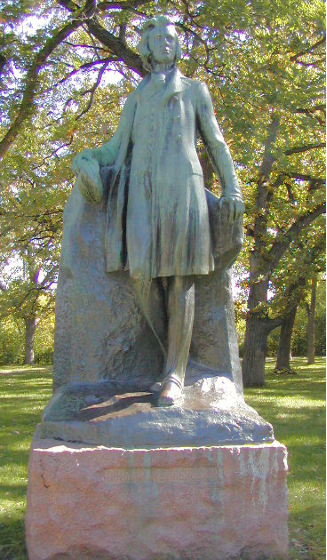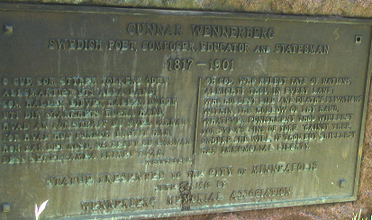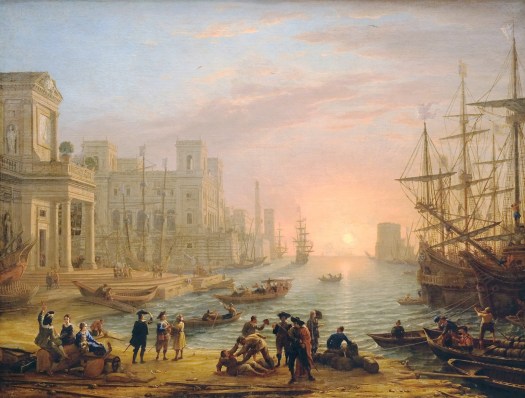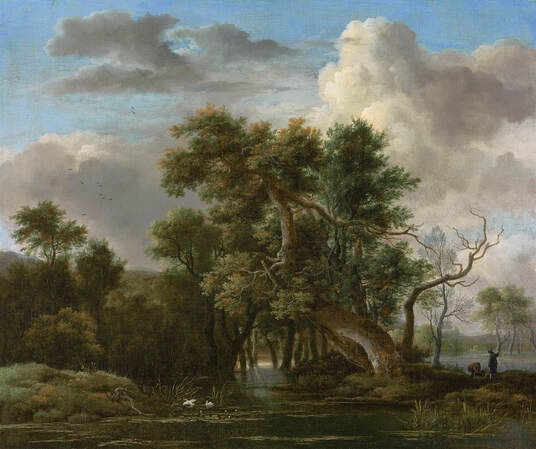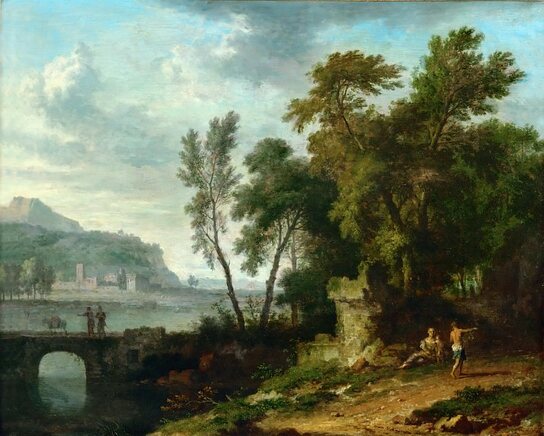|
Gunnar Wennerberg was an acclaimed Swedish poet, composer of music, educator and statesman who lived from 1817 to 1901. A statue of him was presented to the city of Minneapolis in 1915 by an association dedicated to preserving the memory of his accomplishments. Jerome Berglund resides just down the street from the park in which he first chanced upon a statue depicting the author of these pieces, which catalyzed a life-changing journey to deliver an important volume of literature from his forefathers’ language into his present tongue. His own writing publications include short stories, dramas, haiku and prose poetry, online and in print. ** Memories From the World of Dreams “How then, can a scolding be served, So that they who are receiving it feel No discomfort, but only joy rather?” Anyone who knows how sweet it feels To receive a letter from the one you love, A dispatch which pure affection reveals And whose briefest phrase does carry with it Hope and joy, spring and sunshine, Surely also grasps that the further split By time and space person’s separated From the beloved one sending the missive, The dearer the message will seem weighted, More adulation’s receipt deemed befit. Once I did receive just such a letter Posted from Vienna – it is not like That represented only time, to wit Such a happiness has occurred for me; Oh no, often things had transpired similarly. – But the letter here mentioned by degree Was in one manner different from those, For raises question which within arose, Appealing to me, who did receive it, But which demanded reprimand to close For the dear one who had transmitted it. How then, can a scolding be served, So that they who are receiving it feel No discomfort, but only joy rather? That's how I had wanted to present it; But that was not so easy, I gathered. How I wracked my brain for means to commit, Rubbed my forehead, brow increasingly knit, However, I could not see manner fit Or find a way which felt tastefully set. The answers that I would compose with grit, They all seemed woefully inadequate Each more than the last - and so I scrapped them. This one did appear too lenient, That one too serious or expedient. So I sat intently before the desk, My forehead propped where my left hand it met, A pen lifted, wavering in my right; Reminiscent of one who, quite aloof, Grapples with existential concerns. Alas, but that was not place my mind went; For, instead of analyzing my plight, Instead my thoughts drifted away to her, Forgetting both myself and my reproof. And once lifted that disturbance so deep, Still scales remained obscuring my eyes, And I knew by my protracted yawning That ever nearer slumber was drawing. It’s possible, that so I did fall asleep, That’s much more probable, when my mind leaps To recalling how like a dream it was, What I then came to reap. ** A boy, Now stepped silently into this stifling room, Unreservedly at table sit down presumed, Surveyed me with sharp eyes, and smiling coy Asked mischievously if could act envoy And assist me with crafting a response by plume. He was as neat and handsome as all the day, Enthusiastic with a boyish joy, Which delighted me. To his offer’s display, I therefore gave my answer without delay In the affirmative. But then he said: “Good, but must adhere to these strict conditions, That I avoid all digressions’ tread, Don’t interrupt, and you write sans omission Mute and gamely . . . What I dictate and commission.” And I agreed to this also. With nod he then began reason’s employ: “Dear, beloved! You ask of your own volition: Are you mine and no one else’s? I must tremble to answer, though, For my love is mercurial And I love many girls by my own admission.” At the wince I did then exude, He raised his finger menacingly. I kept quiet, he continued: “However, you ask, and find I Have no right to stay mum, a reply stem, Am bound in verisimilitude Your treacherous rivals to supply. But I beg you, please pardon, and spare them And me your fury hence accrued!” “With five today I’ve already conferred And the sixth is here with me now. When she leaves, at that point surely then my Seventh mistress will arrive here. Do not demand I reveal to your eye Their identities! Instead you can try And state names. Yourself must avow, If you can, guess to which they will answer.” “When I woke up this morning how An image flew lightly and airily As a delicate summer cloud[i] past me; Slowly it touched a ring on my finger And then without ado dispersed. And I kissed ring - with my lips pursed – She’d given, so happy could burst; For that image, how light and how airy, As a summer cloud, it was hers.” “Tell me the name of Her, This girl, whom I love – Alas, forgive me! – utmost in the world!” “Then, after dressing myself, I sauntered out And through congested streets did veer, Found way to halls of Belvedere.[ii] Hours then passed by like minutes cleared. However, mine eyes at last did tire Imploring me to relent, and I was Just preparing to leave, when suddenly From inner hall picture like a crier Irresistibly attracted me: Hushed, as if rapt by Armida’s briar,[iii] I observed a pine forest towering, [i] An expression earliest used by William Shakespeare, which the Oxford dictionary defines as a cloud which is 'fleeting and does not spoil fine weather'. [ii] Italian for: ‘Beautiful view.’ A celebrated Austrian building compound in Vienna which includes several palaces in the baroque style, and houses one of the world’s earliest public museums – containing a renowned picture gallery. [iii] A Saracen sorceress who became a popular subject for numerous operas and ballets, first written of in the poetry of Torquato Tasso from Renaissance Italy. Holds her would-be lover captive in a garden which she has enchanted. And spruces gnarled, with birches flourishing, The copses slowly swaying of the wind; Over deep and cloudless skies which bestir A quality of quiet melancholy that extends Or - if you prefer – a Reflection of that blushing which the evening portends; But within the foreground of the painting I saw on mossy rock a girl dainty; The sun cast a ray in purplish streak Over the warm rosiness of her cheeks Daubing her lily-white shoulder’s smooth peaks. Then I could look at nothing else. So enamored I dashed forward and . . . oh, disappeared in clamor, Had stunning image, I just saw pieces clatter, Here and there, all across the wall they were scattered. There was the forest! Ruisdael[i] portrayed the matter. It was quiet; However, when all’s said and done, Previous was still even quieter than this one. – Here was a sunset, captured forever By Claude Lorrain![ii] My painting, however, Was much warmer than that one can measure. – Here’s a rose, there a lily at leisure From stroke of Huysum’s[iii] smooth paintbrush! Still, by contrast they seem dull and weathered [i] Jacob van Ruisdael was the Netherlands' pre-eminent Golden Age landscape painter and maker of etchings. Thanks in part to his contributions Dutch art became widely popular throughout the world during the 17th century. [ii] French baroque painter who passed much of his lifetime in Italy. He distinguished his landscapes by staging them with biblical or mythological characters and scenery. [iii] Jan van Huysum, another Dutch painter from a line of artists specializing in portraying flowers, who filled his landscape paintings – some of which presently resides in the Louvre – with fantastical architecture and subjects. Against those I saw in that forest world. – Compared to that girl! - What youth she displayed, What fresh and luxuriant coloring! Great Titian,[i] do not into anger swing! But, by God, weak facsimiles just the same These landscapes present when without my flame.” “Tell me now what her name is, This Flame, whom I love – Alas, forgive me! - utmost in the world!” “Have you got it yet, then perhaps can guess The name of another fine girl that, In a most fetching, checkered woolen dress And a simple, everyday straw hat Did come into the “Golden Star”[ii] and sat At table with me this afternoon, pressed Between Serbs and Bulgarians, Germans, Lombards, Bohemians Magyars and Croatians! She accompanied me for the duration, And made jolly and pleasant all situations, Inquired of me, offering her own cool ration - [i] A versatile Venetian Renaissance painter, considered to be the most significant of the 16th century school known for his inimitable application of colour pallettes. [ii] The Goldner Stern hotel, situated within the health resort Muggendorf in the Swiss quarter of Germany, dates back to the late 1600s and offers a variety of destinations to traverse, from the natural – rivers, caves, and unusual rock formations – to man-made wonders like medieval castles and spas. With cheerful nod - if water drank me in toto Then jokingly asked if I liked the risotto? And while I talked with the Croatians, The Germans, and stately Bohemians, Yet, I could think only of that expression, Hers alone, which beside persisted to beckon.” “Tell me now what her name is, This Expression, whom I love – Alas, forgive me! - utmost in the world!” “After dinner, when already flitting Dusk had spread its gauzy veil over Evening in the proud imperial city, I went home. Was just arriving, rover, At St. Stephen's Square,[i] when from The church's inner sanctum holy tones Reached me; and soon I stood there all alone By pillar immersed by choir in delay, Listening to the pious petitions Of the temple’s music: “cor mundum crea In me, Jesu domine!”[ii] – And [i] St. Stephen's Cathedral in Vienna, Austria, one of the tallest houses of worship on the planet, is the mother church of the Archdiocese and seat of their Archbishop. Its present incarnation, in the gothic Romanesque style, is situated over the ruins of two previous churches. [ii] Latin for: ‘Cleanse my heart, Lord Jesus!’ Wordless to God lifted my head and prayed Earnestly, my gaze toward the heavens, Then behold, there came a blue-eyed angel Floating from the vault on high, Gazing deep into my soul’s contents, It did say, in a soft voice, then: “Do you say that prayer often?” Oh, those words my angel had lent; And eyes I lowered, their tears spent, Down to the ground, and prayed again With a sigh: “cor mundum crea In me, Jesu domine!”[i] “Tell me now what her name be, This Angel, whom I love – Alas, forgive me! - utmost in the world!” “Do you think you know?” - Well, then accompany me To see the Carinthian Gate Theatre’s[ii] pearls! See what luster, what splendor, what riches! Witness how light from thousand lamps pitches! Observe, how the ravishing ladies of Fashionable Vienna perform to attract the [i] From Psalm 50:12-13, from an a cappella hymn first published by Gregor Lange in 1580. [ii] An Austrian theatre, located in Vienna, which achieved worldwide renown during the 18th and 19th century, graced by the likes of Mozart, Salieri, Chopin, and Beethoven. Largest quantity of ardently pleased Parisian glances from parquet! Look at her there, the Frenchwoman in frieze, The one with cheeks of dimples set And the sharp, alert deportment! . . . And beside her, genuine Viennese, Luxurious as a centifolia,[i] As if wearing Ceylon, cloth so itchy![ii] . . . And next to her, that blonde and pallid fay, Entrancing girl, dressed oh so modestly For the imperial lodge! . . . And too a Serbian with long, black braids enveloped, Eyes accenting her exposed skin swarthy, Flashes from thunderclouds’ periphery! . . . Look at she, marchioness clothed scantily From Milan, whom they have dubbed “la bella”, Like some Juno![iii] . . . And that lady, In velvet dress’s blood-red sheen, With her neck wrapped around with glossed rubies, Hungarian, born to dance, Cinderella! . . . And at her there! . . . and also she! . . . And so many more ‘neath this umbrella! – However, mine eyes don’t stop their gallop, Slip quickly past them all, do this fella’s; [i] “Hundred petaled” or "cabbage” roses, popularized in still lives painted by the Dutch, which breeders created through advances in hybridizing of the seventeenth century. They are notoriously hardy, prickly and fragrant. [ii] An Asian tree whose richly scented bark is tried to produce cinnamon. [iii] Roman goddess who protects the state. Wife of Jupiter, associated with the peacock, equated to Hera in the Greek pantheon. Mother of Juventas (Hebe). Because for another I am always looking, That far away in the north I had saw one spring Who since remained in my memory: Light and dazzling as the day’s warmth sweetly sings Was she, dressed with carbon black that did snugly cling Silk with necklace over her bosom, in a string Of dark coral-colored beads, Like the flame of her homeland’s northern lights, When low, and still in the process of flight Rising from its nocturnal bed of clouds. Is she not here tonight, within this show? May I not see her . . . Then the Overture launches into Fidelio.[i] And then I squeeze my eyes tightly closed, so As to only, only hear. – Oh, and then slowly she sways towards me Over the immense sea of harmonies My faithful, Swedish girl in my ear, Like the flame of her homeland’s northern lights, When low, and still in the process of flight Rising from its nocturnal bed of clouds.” [i] The only opera Beethoven ever wrote, alternately titled ‘The Triumph of Marital Love’. It involves a wife in disguise liberating her imprisoned husband. “Tell me now what her name is, My Swede, whom I love – Alas, forgive me! – utmost in the world!” “Good; you smile. But then also declare Who is the kind one that is now with me? This very moment sits by, does this Ms, My side in darkness, teasing from above. On my lap she does put her hand curled, And the winter I feel not its fizz; With just glance I verify she is faithful, And no indecision can I detect. At every other line I interject I turn around and do whisper thereof: “You, my home, alas, you my so fair, Warm home!” – And so I let her arms project Close around me tenderly like a glove, Until says in tone she’s known to affect: “Write now, apply yourself diligently! Otherwise, perhaps leaving you I’ll be.” “Tell me now what its name is, This Home, which I love – Alas, forgive me! – utmost in the world!” “Twelve o’clock’s striking has already past hurled. Time is overdue for getting some rest. She, my Home, has wished a good night And quitted me. Yet do not believe, thee, That I mourn, however! Have I not admitted That my love is expressed mercurially, And that I love many girls, right? So know when I go to bed fancy free, As my light goes out, then comes . . . Have you guessed? - Well, it’s “mine and no one else’s” I’m blessed With the presence of. When she is with me, I do not think of the others addressed.” “Tell me now what its name is, This Presence I love – Alas, forgive me! – utmost in the world?” “Now I’ll bid you farewell! You've your scolding gotten And are probably tired of this guessing game’s fun. Therefore, go sleep both well and true, So you can dream of person who . . .” “However, there is one last mystery to be spun, But - I promise – after it we shall then be done! Who would it be that is so appreciative To discover that at once he gets to love none Other than Her, the Flame, the Expression, the Angel, The Swede, the Presence and the Home, stitched Elegantly together, all rolled into one?” ** “Write your name now,” the boy said to me next, “And postscript I will proceed to inscribe, Explaining that while you holding pen gibes, That was I, in fact, who composed the text.” “No, you cannot!” - I exclaimed. Waking – I discovered I was alone. The boy was gone, letter lay on the pad Without any additional lines on written; Only a small picture more had been sown Sketched in the corner. Depicted a lad, Identical to one who with me did sit in, In every way – except that he had wings. Gunnar Wennerberg, translated by Jerome Berglund ** Swedish: Dock, har skall en aga ffifraa, Så att den, som får den, kinner Ingen amårta, endast glådje?” Den som vet, hur ljuft det kännes Att få bref från den man älskar, Bref, som andas idel kärlek Och hvars minsta ord för med sig Hopp och glädje, vår och solsken, Vet nog äfven, att ju längre Skild till tiden och till rummet Från den älskade man vistas, Desto mera kärt är brefvet, Desto flera kyssar får det. En gång fick ett sådant bref jag Uti Wien — icke så som Var den gången enda gången Denna lycka händt mig; ack nej, Ofta har det samma timat. — Men det brefvet nu jag nämnde Var i ett fall olikt dessa, Ty det fans i det en fråga, Ljuflig visst för mig, som fick den, Men som fordrade en aga Åt den älskade, som gaf den. Dock, hur skall en aga gifvas, Så att den, som får den, känner Ingen smärta, endast glädje? Sådan ville jag den gifva; Men det hade sig så lätt ej. Hur jag mödade min hjerna, Hur jag gned min stackars panna Kunde dock jag icke hitta Något sätt, som föll i smaken. Svaret, som jag skulle skrifva, Böijadt blef den ena gången På den andra — och förkastadt. Än det vardt för eftergifvet, Än för allvarsamt och tråkigt. Så jag satt framför mitt skrifbord, Pannan stödd mot venstra handen, Pennan lyftad i den högra; Alltså ganska- hk en sådan, Som med själsarbete sysslar. Ack, men så var icke fallet; Ty, i stället för att hjelpa, For min tanke bort till henne, Glömde både mig och agan. Och när han väl farit från mig, Skymde stilla skuggor ögat, Och jag kände till min nesa Att jag var på väg att somna. Möjligt ock, att så jag gjorde, Nästan troligt, då jag minnes, Huru likt en dröm det var, som Sedan tilldrog sig. ** En gosse, Steg nu ljudlöst in i rummet, Satte sig helt fritt vid bordet, Såg med klippska ögon på mig, Log och sporde skälmskt, om han ej Finge hjelpa mig med svaret. Vacker som en dager var han, Barnsligt glad och med ett tycke, Som förtjuste mig. På frågan Gaf jag derför utan tvekan Ja till svar. Men då han sade: “Godt, men endast med det vilkor, Att jag slipper alla afbrott, Alla frågor, att du skrifver Tyst och stilla ... jag dikterar.” Och jag biföll åfven detta. Med en nick han då begynte: “Kära, älskade! Du frågar: Är du min och ingen annans? Och jag bäfvar för att svara, Ty min kärlek är ombytlig, Och jag älskar många flickor.” Vid den ryckning nu jag gjorde, Lyfte han sitt finger hotfullt. Jag teg still, och han fortsatte: “Dock, du frågar, och jag finner Att jag ej har rätt att tiga, Att det år min pligt att uppge Dina farliga rivaler. Men jag ber dig, skona, skona Dem och mig uti din vrede!” “Fem i dag jag träffat redan Och den sjette nu är hos mig. När hon går, så kommer säkert Hit min sjunde älskarinna. Fordra ej, att jag dig säger Hvad de heta! Säger blott, hur Jag dem kallar. Sjelf du måste. Om du kan det, gissa namnen.” “Då jag vaknade i morgse Flög en bild så ljus och luftig, Som en sommarsky förbi mig; Rörde sakta med sitt finger Vid min ring, och så försvann den. Och jag kyste glad och trogen Ringen, som jag fått af henne; Ty den bilden, ljus och luftig Som en sommarsky, var hennes.” “Såg mig namnet nu på Henne, Denna flicka, som jag älskar — Ack, förlåt mig! — högst i verlden!” “Sedan, då jag klädt mig, gick jag Genom folkuppfylda gator Bort till Belvederes salar. Timmar gingo som minuter. Dock till sist mitt trötta öga Bad mig sluta, och jag var just I begrepp att gå, då plötsligt Från en inre sal en tafla Omotståndligt drog mig till sig: Tyst, förtrollad som Armidas, Sågs en skog af höga furor, Smärta granar, ljusa björkar, Sakta vaggande för vinden; öfver djup och molnfri himmel Spreds ett drag af stilla vemod Eller — om du hellre vill — ett Återsken af aftonrodnad; Men i taflans förgrund såg jag På en mossig sten en flicka; Solen göt en ström af purpur öfver kindens varma rosor öfver skuldrans skära liljor. Mera såg jag ej. Betagen Sprang jag fram och ... ack försvunnen, Var den undersköna taflan, Och jag såg blott bitar af den, Spridda här och der på väggen. Der är skogen! Ruysdael gjort den. Den är tyst; dock var den andre Ännu tystare än denne. -- Der en aftonrodnad, målad Utaf Claude Lorrain! Min taflas Var dock varmare än denna. -- Der är ros och der är lilja Af van Huysums lena pensel! Dock, de äro matta, vissna Emot dem jag såg i skogen. — Der är flickan! — Se hvad ungdom, Se hvad frisk och yppig fägring! Store Tizian, vredgas icke! Men, vid Gud, en svag kopia Är hon blott utan min flamma." “Säg mig nu hvad namn hon eger Denna Flamma, som jag älskar — Ack, förlåt mig! — högst i verlden” “Har du gissat det, så säg mig Namnet på en annan flicka, Som i rutig ylleklädning Och i enkel hvardagshalmhatt Kom till “goldne Stern” i middags, Då jag satte mig till bordet Mellan Serber och Bulgarer, Tyskar, Böhmare, Kroater, Magyarer och Loinbarder! Hela tiden satt hon hos mig, Gjorde allt så gladt och trefligt, Räckte fram sitt glas och bad mig Med en munter nick om vatten Drack mig till och sporde skämtsamt, Om jag tyckte om risotto’n? Och jag pratade med Tyskar, Magyarer och Lombarder, Men jag tänkte blott på min-min, Henne blott, som satt bredvid mig.” “Säg mig nu hvad hon månd’ heta Denna Minmin, som jag älskar — Ack, förlåt mig! - högst i verlden!” “Efter middagen, då redan Skum sin slöja qvällen bredde Öfver stolta kejsarstaden Gick jag hemåt. Kommen var jag Just till Stefansplatsen, då från Kyrkans inre helga toner Nådde mig; och snart jag stod der Vid en pelare i koret, Lyssnande till tempelsångens Fromma bön: “cor mundum crea In me, Jesu domine!” — Och Tyst jag bad till Gud och lyfte Innerligt min blick mot höjden, Se, då kom en blåögd engel Sväfvande från höga hvalfvet, Såg mig innerst in i själen, Sade se’n med stilla stämma: “Beder du den bönen ofta?” O, det var min engels stämma; Och jag sänkte tårfyldt öga Ned mot jorden, bad ånyo Med en suck: “cor mun dum crea In me, Jesu domine!” “Såg mig nu hvad namn hon eger, Denna Engel, som jag ålskar — Ack förlåt mig! — högst i verlden!” “Tror du det? - Nå, följ då med mig Bort till Kärnthnerthor-theatern! Se hvad prakt, hvad glans, hvad rikdom! Se hvad ljus från tusen lampor! Se, hur Wiens sköna damer Tåfla om att draga till sig Största mängden af förtjusta Parisblickar från parterren! Se på henne der, fransyskan, Den med groparne i kinden Och den qvicka, vakna blicken!.. Och på henne, äkta Wienskan, Yppig som en centifolia, Klådd som vore hon på Ceylon!... Och på henne, den der blonda, Enkelt klädda, vackra flickan Uti kejsarlogen!... och på Serbiskan med långa, svarta Flätor, mörkbrun hy och ögon, Lika blixtrar utur åskmoln!... Se på henne, marquesanan Från Milano, nämnd “la bella”, Lik en Junol... och på henne, Flickan uti blodrödt sammet, Med rubiner omkring halsen, Ungrarinna, född att dansa!... Och på henne der!... och henne!... Och på många, många andra! — Dock mitt öga vill ej stanna, Halkar snabbt förbi dem alla; Ty det söker jemt en annan, Som jag en gång såg i norden Och alltse’n har i mitt minne: Ljus och bländande som dagen Var hon klädd i kolsvart siden Med ett harnesk öfver barmen Utaf mörka strålkoraller, Lik sitt hemlands norrskensflamma, Då den lågande, men stilla Stiger upp ur nattlig molnbädd. År hon icke här i afton? Får jag icke se ... Då böljar Ouverturen till Fidelio. Och jag sluter mina ögon För att endast, endast höra. — O, då gungar sakta mot mig På ett haf af harmonier Hon, min trogna, svenska flicka, Lik sitt hemlands norrskensflamma, Då den lågande, men stilla Stiger upp ur nattlig molnbädd.” “Säg mig nu hvad namn du gifver Åt min Svenska, som jag älskar — Ack, förlåt mig! — högst i verlden!” “Godt; du ler. Men säg då också Hvem är den, som nu år hos mig? Just i detta nu hon sitter I min kalla, dunkla kammar. På mitt knä hon lägger handen, Och jag känner ingen vinter; I mitt öga ser hon trofast, Och jag märker intet mörker. Vid hvarannan rad jag skrifver Vänder jag mig om och hviskar: “Du, mitt hem, ack, du mitt ljusa, Varma hem!” — Och så jag sluter Henne ömt i mina armar, Tills med välkänd röst hon säger: “Skrif nu, skrif nu och var flitig! Annars kanske går jag från dig.” “Säg mig nu hvad mitt Hem heter, Denna flicka, som jag ålskar — Ack, förlåt mig! — högst i verlden!” “Tolf år klockan redan slagen. Det är tid att gå till hvila. Hon, mitt Hem, har sagt god natt och Gått ifrån mig. Tro dock icke, Att jag sörjer! Jag ju erkänt, Att min kärlek är ombytlig, Att jag älskar många flickor? Och jag vet, att när jag lagt mig, Släckt mitt ljus, så kommer.. gissa Hvem! — Jo, “min och ingen annans” Eccola. När hon är hos mig, Tänker jag ej på de andra.” “Säg mig då, hur lyder namnet På den Eccola jag älskar — Ack, förlåt mig! — högst i verlden?” “Nu farväl! Du fått din aga Och är säkert trött att gissa. Derför sof nu godt och dröm om Den som ...” “Dock, ännu en gåta, Men — jag lofvar det — den sista! “Hvem är det, som år så lycklig Att på en gång han får älska Henne, Flamman, Minmin, Engeln, Svenskan, Eccolan och Hemmet, Alla, alla i en enda?” ** “Skrif ditt namn nu”, sade gossen, “Och post scriptum skall jag skrifva, Att du hållit sjelf i pennan, Men att jag författat texten.” “Nej, det får du ej”” - jag utbrast. Vaknade och — ensam var jag. Gossen var försvunnen, brefvet Låg der, ej en rad fans skrifven; Blott en liten bild var ritad I ett hörn. Det var en gosse, Helt och hållet lik den skålmen, Som var hos mig, men — med vingar. Gunnar Wennerberg
0 Comments
Your comment will be posted after it is approved.
Leave a Reply. |
The Ekphrastic Review
COOKIES/PRIVACY
This site uses cookies to deliver your best navigation experience this time and next. Continuing here means you consent to cookies. Thank you. Join us on Facebook:
July 2024
|
